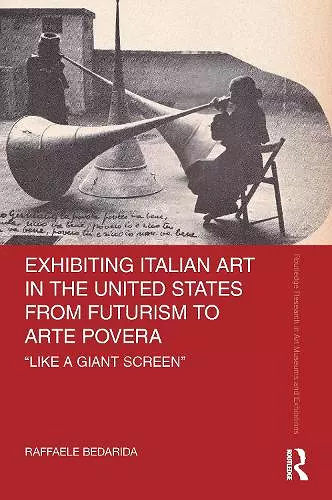Exhibiting Italian Art in the United States from Futurism to Arte Povera
'Like a Giant Screen'
Format:Paperback
Publisher:Taylor & Francis Ltd
Published:27th May '24
Currently unavailable, and unfortunately no date known when it will be back
This paperback is available in another edition too:
- Hardback£145.00(9781032081298)

This volume explores how Italian institutions, dealers, critics, and artists constructed a modern national identity for Italy by exporting – literally and figuratively – contemporary art to the United States in key moments between 1929 and 1969.
From artist Fortunato Depero opening his Futurist House in New York City to critic Germano Celant launching Arte Povera in the United States, Raffaele Bedarida examines the thick web of individuals and cultural environments beyond the two more canonical movements that shaped this project. By interrogating standard narratives of Italian Fascist propaganda on the one hand and American Cold War imperialism on the other, this book establishes a more nuanced transnational approach. The central thesis is that, beyond the immediate aims of political propaganda and conquering a new market for Italian art, these art exhibitions, publications, and the critical discourse aimed at American audiences all reflected back on their makers: they forced and helped Italians define their own modernity in relation to the world’s new dominant cultural and economic power.
The book will be of interest to scholars working in art history, social history, exhibition history, and Italian studies.
"Bedarida's analysis has the merit of putting works and facts at the center, with a first-hand archival excavation work on largely unexplored sources, through which he revises discourses and narratives that are dominant or have been consolidated by critical laziness. Against such narratives, the author emphasizes the porosity of his story, opening up ample margins for further study. [...] Indeed [Bedarida] provides a revised method by insisting on the need for 'different scales' of approach and evaluation, beyond competitions or hierarchies to be established in one [national school] or the other."
--La Diana
"Bedarida's analysis has the merit of putting works and facts at the center, with a first-hand archival excavation work on largely unexplored sources, through which he revises discourses and narratives that are dominant or have been consolidated by critical laziness. Against such narratives, the author emphasizes the porosity of his story, opening up ample margins for further study. [...] Indeed [Bedarida] provides a revised method by insisting on the need for 'different scales' of approach and evaluation, beyond competitions or hierarchies to be established in one [national school] or the other."
--La Diana
"Exhibiting Italian Art in the United States from Futurism to Arte Povera is a fundamental contribution to contemporary debates in art history that expertly dissects the exhibition device in relation to political, historical and cultural contexts. Uncovering their inherent dynamics of power and control, the book warns against the consideration of exhibitions as neutral apparatus, encouraging a more conscious and discerning reflection on their role, potential and significance"
--Association for Art History
"Due to his excellent archival work and revision of known histories, Bedarida can offer compelling insights that decentre the USA as the geographical protagonist of the last century as well as expose the myriad ways in which the experience of the arts mirrors that of Italian national identity construction throughout these heated decades."
-- Adrian R. Duran in International Yearbook of Futurism Studies, Vol. 13, 2023, pp. 463-467.
ISBN: 9781032106069
Dimensions: unknown
Weight: 440g
228 pages